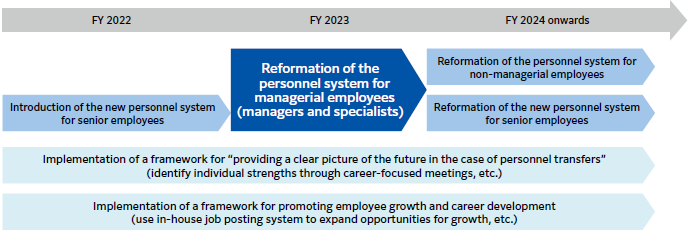Human Resources
Transforming Human Resources Management to Mobilize Individuals’ Strengths and Promote Growth
The second phase of our Medium-Term Business Plan (FY2023-2026) focuses on enhancing corporate governance and developing conditions that promote employee health and motivation. Through this, we will realize our Group-wide strategies of co-creating platforms for employee excellence and enhancing our management foundation. Key areas in our HR strategy include Health and Productivity Management, operating a new personnel system with greater employee empowerment, establishing DI&B principles, and developing diverse human resources to lead business in the future. We will continue taking results-focused actions to achieve our FY2026 targets for the related KPIs.
The new managerial personnel system that we launched in July 2023 began from a system that assigned grades based on roles. Strategy-based role design makes clear to employees what the HR requirements and necessary career background are, which supports their reskilling and career development. In terms of management and business strategy, the system provides visibility into where we have too many or too few of the needed resources. We can also gain a better understanding of the best people to achieve the Medium-Term Business Plan and tools to build an HR portfolio. This will enable us to implement HR management linked to management strategy that clearly defines what types of human resources we need to recruit, develop, and reassign. This, in turn, contributes to business management and achieving the goals of our Groupwide business strategy.
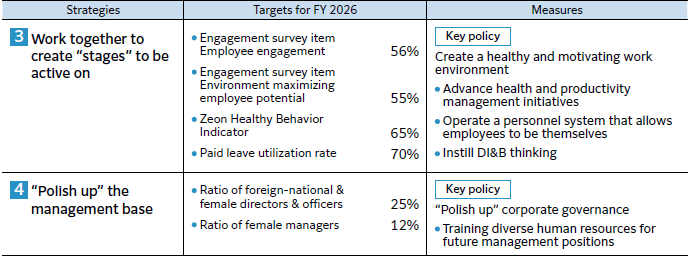
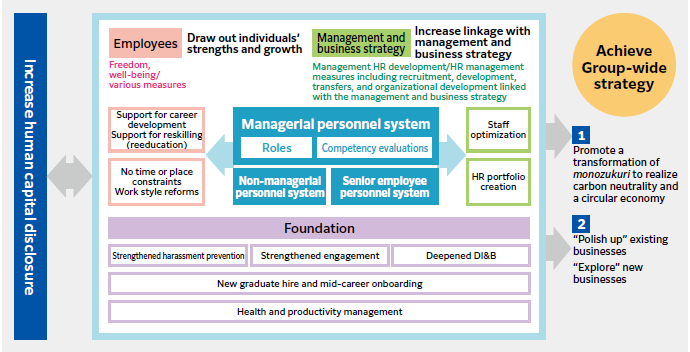
Enhancing Engagement through Employee Engagement Surveys
At Zeon, we conduct employee engagement surveys as a means of gauging the results achieved for the “stages” and their current statuses. Employee engagement is an indicator of employees’ motivation, meaning their commitment to the company and autonomous effort identified from the surveys that we give. Another indicator identified from the surveys is “environments that leverage employees,” which expresses employee-friendly workplace environments that leverage employees’ skills and talents.
We began giving the employee engagement survey in FY 2021. Employee engagement in FY 2022 received a score of 48%, while environments that leverage employees received a score of 46%. To support creating, implementing, and establishing improvement plans for organizational issues identified from the surveys, we implement improvements at workplaces through division-based workshops and are endeavoring to improve employee engagement through our human resource strategy.
We have set the 2026 targets of 56% for employee engagement and 55% for environments that leverage employees. Our employee engagement target for 2030 is set at 75%, the average value for global high-performing companies, and we will aim to create better “stages” to reach this target.
Women’s Participation and Advancement in the Workplace
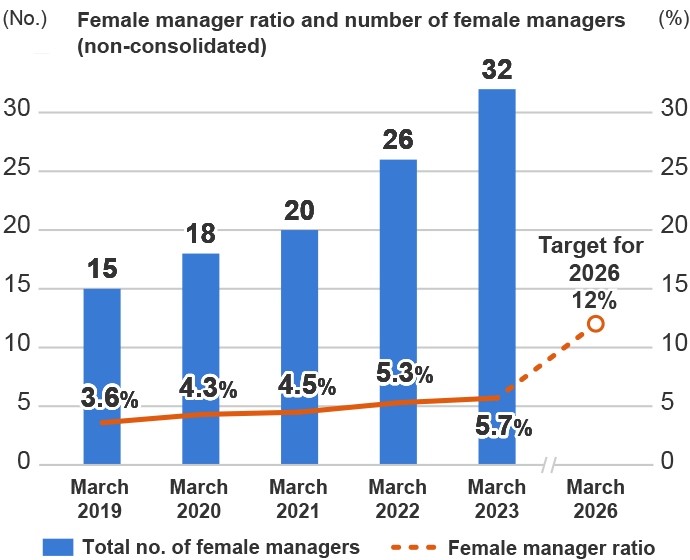
In the context of an ongoing decline in the working population due to low birth rates and an aging population, the promotion of participation and advancement by women in the workplace is essential to Zeon’s continued achievement of sustainable growth. There has been an increase in the number of female employees either holding or capable of holding the positions of department manager or section manager, and we are striving to expand the opportunities for female employees to be increasingly active in such roles. As of March 31, 2023, 13.4% of our company’s employees, and 5.7% of managers, were female. We aim to increase the percentage of female managers to 12% by 2026.
When we assessed gender equality at Zeon using WEPs (seven international principles promoting women’s economic empowerment) in March 2022, we found a need to offer greater support for women’s career development due to a lack of women role models in management positions. We are therefore planning to establish a mentor program and a sponsor program in the near future to support women employees. We plan to build a framework from these programs for discussing HR requirements and enabling objective evaluations, as well as have this process repeated regularly, with the goal of creating successor development plans for diverse employees who will lead future management.
Instilling DI&B Thinking
We are promoting DI&B, with Belonging added to the principles of Diversity and Inclusion. We are conducting both top-down and bottom-up activities with the goal of mobilizing employees while respecting their diversity (D&I) and making everyone at Zeon have a sense of security and trust that they are accepted (Belonging). Creating a culture of DI&B, where everyone is glad they work at Zeon and feels like they have a place to belong, is at its core the process of “creating ‘stages’ in which all employees can demonstrate their individual strengths” set forth in our Medium-Term Business Plan.
Zeon have established a dedicated department, the DI&B Promotion Office within the Human Resources Division, while also launching promotional projects with proposals solicited internally to help entrench DI&B in our organizational culture. Members of various ages, genders, and nationalities recruited by means of wide-ranging calls are distributed across various teams, where they are working to put into action “What we want to do to establish a culture of DI&B at Zeon.”
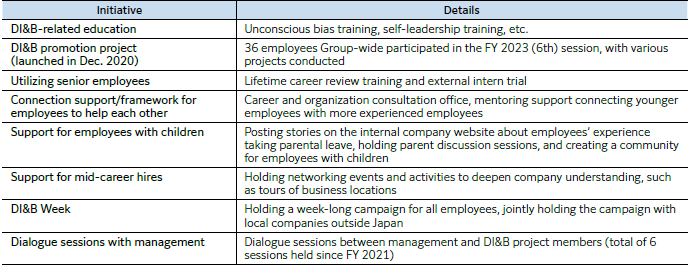
Reformation of the Personnel System
We updated our personnel system in July 2023 to create a job-specific evaluation system for managerial staff. In the former system, grades and compensation were used as stepping stones to managerial roles, based on the person’s ability to perform their duties. More recently, however, the roles (i.e., duties) employees are expected to perform have been diversifying.
To foster employees’ motivation and create “stages” that allow employees to demonstrate their individual strengths, we decided that we needed to transition to a personnel system that draws out employees’ diverse strengths and prompts their growth. This led to the revision of our managerial personnel system.
We revised the system with the following three objectives. The first is to reward employees according to the demands of the role they are expected to perform by creating a multitrack personnel system. In addition to the management roles created based on our existing roles, we introduced specialist roles with grades set by evaluating job performance on an individual basis. We also clearly defined the career paths and set compensation according to the demands of the role.
The second objective is to encourage growth after promotion to a managerial role. We introduced conduct (competency) evaluations that include specific items set for individual roles and are based on demonstrated conduct. This is designed to increase the transparency of performance evaluations, drive creation of results, and serve as a guide for long-term professional development.
The third objective is to increase career track visibility for employees. By clarifying the requirements of each role, employees have a clearer picture of their career paths and the company can see where there are too many or too few of the resources needed to achieve the management strategy. This information will be used in personnel management to encourage employee growth and determine what types of resources are most need to be recruited, developed, and assigned to roles.
As part of implementing the new managerial personnel system, we will also build an HR portfolio to support getting the right people in the right positions to achieve our management and business strategy. Clarifying the HR requirements tied to each managerial role is designed to encourage the professional development of young and mid-level employees who want to advance to a managerial position as well as present a clearer picture of available career paths.
We are planning to revise the personnel system for non-executive employees in FY 2024 and beyond. In this revision, we will identify issues in work styles and career development through two-way dialogue and review how to support opportunities for young employees to independently develop their careers. We plan to revise the system in FY 2024 to reflect our approach to a job-based personnel system for senior employees, based on the new personnel system for managerial employees.
